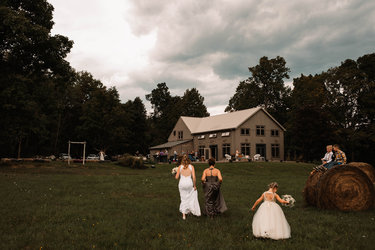‘Affordable elegance’: Siblings turn family property into wedding venue
RENSSELAERVILLE — A new wedding venue, Bluebird Farm, has opened in Rensselaerville, operated by four siblings who have turned their inherited property into a venture they hope will provide couples “affordable elegance with a view” and help bring money into the community.
“It probably wasn’t the best time of year for us to be launching a business,” Kathryn Sikule, one of the founders, told The Enterprise, “but this is a family business, so we’re probably better poised than some of the others.”
Sikule and her siblings — Susan, Carolyn, and Michael, all of whom have retained the Sikule surname — inherited the 100-acre Medusa property in 2017, after the death of their mother. It had originally been purchased in 1945 by their father, a steamfitter and construction worker who welded ships during World War II and moved upstate from Brooklyn with his mother after the war; the pair ran the property as a boarding house.
Once the property was in the siblings’ hands, Sikule said, they brainstormed ways to make it sustainable. As they were considering options, Michael Sikule’s son, who was engaged and had struggled to find an affordable but scenic wedding venue in the Capital District, asked if the wedding could be held on the family property, which overlooks the Catskills, where he had met the woman he would marry.
Though hosting a wedding would require a renovation of the property’s 19th-Century barn, “My sisters and I kind of looked at it and said, ‘Let’s see what we can do,’” Michael Sikule said.
Hiring a professional to handle the project would have meant waiting three years since they were booked that far out, Sikule said, so instead he took it on himself, acting as general contractor and delegating tasks as needed.
“Living on a farm, you have to be handy, so I always liked doing stuff with my hands,” said Sikule, whose professional background is in finance. “But this was the first time I had ever done a project this large. I was lucky that I knew people in the area who I could ask, ‘How should I be doing this?’”
Sikule said that he had help from engineers he knew from his time working for the New York State Thruway Authority as well as local contractors he hired, and an Amish group who helped with re-roofing and constructing “the shell” of an addition the siblings decided to build.
Among the contractors he hired was Josh Strobeck, a carpenter, who took on a mentor role.
“I was his right-hand-man rather than him being my right-hand-man,” said Sikule. “He was telling me what to do and how to do it, and how to make it look good.”
When all was said and done a year-and-a-half later, the barn had all-new board-and-batten siding, and a 1930s addition to the original structure had been replaced with an addition that was “more functional,” Sikule said.
The project ended up being such an investment that the siblings decided to turn it into a venue for weddings, with plans to open it up for other events down the road.
Kathryn Sikule said that people thought the siblings were “crazy for sharing it,” but Sikule, who, in addition to owning Brownstone Creatives, a design firm in Albany, rents out properties for Airbnb, was comfortable with the idea of allowing strangers to enjoy what they can’t own themselves.
“The beauty of a barn,” she said, “is it’s not so fragile. The ability to have people enjoy the space, and the ability we have to share it, is at a higher level than some of these minor things.
“We do know that it’s a sacrifice,” she added, “We won’t have total privacy, and we’ve made changes. In the barn, we’ve had to put up different security things that you wouldn’t have to if it was just your own personal barn, but those are the things you have to do to make it safe.”
In addition to pastoral beauty, the expansive property provides an opportunity to hold weddings during the coronavirus pandemic, which naturally complicates, if not prohibits, large gatherings.
“That’s the beauty of a barn wedding,” said Sikule. “We have a whole field so you can be part of the event and still keep your distance.”
Still, the weddings that have been hosted and booked so far have generally been small, Sikule said.
“Obviously people are wanting smaller weddings,” she said, “and we’ve had a few weddings booked in 2021 that ended up being small, just the couple themselves and their immediate family, and then they’re planning something else [for the future].”
And, while the challenges of the coronavirus and renovation have surely, to a greater or lesser degree, been stressful for the family, the Sikules seem content with the way things have turned out.
“It’s really been a positive experience all the way around,” said Michael Sikule, going on to describe a weekend the family and some associates spent painting the barn, only to find that the paint had “sopped up” all the stain, necessitating that they reconvene the next weekend for a total do-over.
“My sisters, my kids, their friends,” he said, “we all came together and got it done.”



